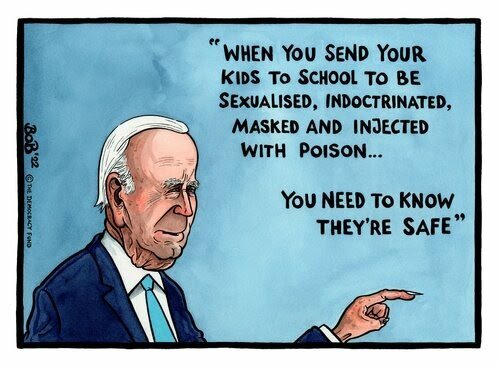-
Posts
8,938 -
Joined
-
Last visited
-
Days Won
46
Content Type
Profiles
Forums
Gallery
Store
Articles
Events
Everything posted by Muda69
-
-
FTA: Yep Mr. Day. You are no longer running a college program but a professional one. Deal with it; it may help with your NFL head coaching aspirations one day.
-
Alcohol prohibition was an abject failure. The War on Drugs is an abject failure. Why will the pending "War on Guns" be any different?
-
-
We no longer have drunk drivers on the road?
-
Uvalde's Biggest Mistake Was Trusting the Police to "Keep Us Safe" https://mises.org/wire/uvaldes-biggest-mistake-was-trusting-police-keep-us-safe Mr. McMaken knocks it out of the park with this commentary.
-
Would look better in Cream and Crimson or Old Gold and Black. Just saying.
-
So it should all be "free"?
-
Yep, all could be provided by the free market.
-

Mercy rule a few years
Muda69 replied to Trojanmp52's topic in The Indiana High School Football Forum
October 17, 2008. 96-0. Never forget. -
Police Botched the Uvalde Standoff. Now Gun Controllers Want to Give Police More Power. https://mises.org/wire/police-botched-uvalde-standoff-now-gun-controllers-want-give-police-more-power Others have reported that parents attempted to go into the school themselves, but were prevented—sometimes violently—by police. According to the New York Post: This video from the scene shows police pinning one person—presumably a parent—to the ground while other officers have drawn their tasers in order to further threaten and intimidate the parents who begged the police to take action. There are conflicting reports over whether or not the police waited more than an hour to confront the gunman, or if they waited "only" forty minutes. So far, the only rationale offered by the police for the long waiting period is that the officers were waiting for a SWAT team to arrive. It remains unclear how the shooter got into the school at all, since he was apparently confronted by law enforcement before he entered: When police finally did enter the scene—after forty or sixty minutes of protecting themselves—many of them ignored the shooter in order to find their own children, as admitted by police personnel on the scene—who also repeated a propaganda line about "those brave men and women." If it is indeed found to be true that law enforcement officers protected themselves while people nearby were being killed—it certainly wouldn't be the first time. "Officer Safety" Is What Matters to Police At the Columbine massacre in 1999, the shooters roamed the school for nearly fifty minutes. Police waited outside for a SWAT team to arrive in order to minimize the risk to themselves. Columbine is now almost universally regarded as a case of police incompetence and inaction. In response, police agencies claimed they had adopted a don't-wait policy for engaging shooters. But apparently many police agencies haven't gotten the memo. At Parkland, a law enforcement officer specifically assigned to the school, Scot Peterson, ran away from the school and hid behind outside structures. Sheriff's deputies did the same. Law enforcement's behavior at Parkland was so inept and so cowardly that in the spring of 2019, the victims' parents sued the Broward County school board and the sheriff's office for failing to take timely action against the shooter who killed seventeen people in February 2018. According to the South Florida Sun-Sentinel, police officers repeatedly sought to protect themselves rather than the people in the school. An analysis of communications among the law enforcement officers at the site of the massacre confirmed there were "at least two times a Broward deputy urge[d] another officer to protect themselves, not confront the killer." As is so often the case, "officer safety" was police's real concern, not public safety. This appears to have been the case at the Uvalde shooting as well. Police Have No Legal Duty to Protect You But don't expect the police to face any repercussions or be held to account. It is now a well-established legal principle in the federal courts that in spite of the marketing gimmick motto of "Protect and Serve," police are not actually under any obligation to protect the public from harm. In the cases DeShaney v. Winnebago and Town of Castle Rock v. Gonzales, the Supreme Court has ruled that police agencies are not obligated to protect citizens. In other words, police are well within their rights to pick and choose when to intervene to protect the lives and property of others—even when a threat is apparent. In both of these court cases, clear and repeated threats were made against the safety of children—but government agencies chose to take no action. The public is generally unaware of this, and taxpayers continue to pay handily for the nonprotection they receive from police. In Uvalde, Texas, for instance, police "services" constitute nearly 40 percent of the city budget. Meanwhile, according to Salary.com, a sheriff's patrol sergeant in Uvalde makes up to $85,400. That's nearly double the local median household income of $45,936. In Uvalde, the police are well paid to stand around. Gun Control Is about Placing More Trust in Police Even while police make it clear—yet again—that trusting the police to provide protection is a fool's game, gun control advocates want to disarm law-abiding private citizens. This, after all, is the fundamental equation behind gun control. More gun control means the centralization of coercive (and defensive) power in the hands of the police. This means when gun control is imposed, the police become relatively powerful while law-abiding private citizens become relatively powerless. But gun control also concentrates coercive power in the hands of non-law-abiding citizens. One effect of this—among others—is that the public must then look all the more to the police to provide defense from violent criminals, who increasingly outgun law-abiding residents. In other words, a key equation in getting the public to accept gun control is to convince them that they don't need guns. But what is the reality? Police officers will spend immense amounts of time harassing peaceful suburbanites suspected of smoking marijuana. They'll break the arm of a little old lady for "stealing." They'll shoot a woman in her own living room with no warning because the officer "feared for his life." But when it comes to actually confronting an armed maniac? Well, then it's time to wait around outside until they can ensure "officer safety." Considering these facts, one would have to be thoroughly irrational indeed to surrender self-defense rights to the same people who are so thoroughly uninterested in stopping violent felons. Gun control advocates, of course, don't see it this way. They apparently believe that gun control legislation just magically makes guns disappear. In the real world, however, gun control requires enforcement. And who is in charge of enforcement? The police—who will bring the same level of competence to keeping guns out of the hands of criminals as they bring to school shootings. Having apparently not noticed the existence of the drug war and its collateral damage, gun control advocates believe that this week's police incompetence means "yes, we absolutely should put the police in charge of more gun prohibitions." The logic here is incoherent, but many no doubt find it compelling. Read More: Police Have No Duty to Protect You Police: We're the Experts—Don't You Dare Criticize Us Lack of Police Accountability Shows the "Social Contract" Isn't Working Yep. Cowardly police very well may have been a contributing factor to this sad, sad event. Yet gun control advocates sill want to gut the 2nd amendment or get rid of it entirely. But the old adage still ring true: "When guns are outlawed outlaws will still have guns."
-
Netflix Airs Ricky Gervais' Controversial Standup, Chooses Actual Entertaining Over Woke Pandering https://reason.com/2022/05/27/by-airing-ricky-gervais-controversial-standup-netflix-chooses-actual-entertainment-over-woke-pandering/ At this point, deeming standup specials transphobic—and taking to task the company that has platformed them—is a well-polished act. The only thing that's changed since this last happened, to Dave Chappelle, is Netflix's resolve to stand its ground. In October, Netflix employees crashed a meeting of company executives and staged a walkout over the streaming service's decision to platform the purportedly transphobic special Dave Chappelle—one of the most famous living comedians who dreamed up the character Clayton Bigsby, a blind white supremacist who doesn't know he's black, and spent most of the early aughts crafting absurd skits about race for Chappelle's Show. The protesters technically never called for deplatforming Chappelle but demanded disclaimers before content that promotes so-called hate speech; for the algorithm to suggest "trans-affirming" content alongside specials like Chappelle's; and for the company to prioritize platforming work by trans/non-binary creators. CEO Ted Sarandos responded that "content on screen doesn't directly translate to real-world harm." But when that failed to pacify the angry hordes, Sarandos claimed he miscalculated. "I should have led with a lot more humanity.… I had a group of employees who were definitely feeling pain and hurt from a decision we made," he told Variety. The company's new policy would involve drawing the line at content that calls for intentionally "physically harming other people." (In the same breath, he hyped a company fund that supports trans and non-binary content creators, catering to one of the employee demands.) "Does Netflix even care that Ricky Gervais's SuperNature is rife with transphobic TERF ideology?" asks Aja Romano this week at Vox. The answer seems to finally be nope; comedy that pokes fun at extremely online trans activists can in fact be both widely amusing and a moneymaker. And Netflix is in the entertainment business, for which both of those components are important. "We program for a diversity of audiences and tastes; and we let viewers decide what's appropriate for them, versus having Netflix censor specific artists or voices," the company said in a policy update earlier this month. "Depending on your role, you may need to work on titles you perceive to be harmful. If you'd find it hard to support our content breadth, Netflix may not be the best place for you." Ergo, Romano argues, the company is "just fine inflicting bigoted hateful rhetoric on its subscribers" and "with the subsequent real-world harm that comes from amplifying such views." "At this point, Netflix—the comedy division, if not the entire company—is not just passively supporting transphobic creators, but seem to be actively courting a transphobic audience," adds The A.V. Club's Mary Kate Carr. "The platform's choice to release this special now," writes Romano, "during a wave of unprecedented anti-trans legislation, is unconscionable." These critics are wrong. The company is not "inflicting" hateful rhetoric on its subscribers; one must consensually opt in to watch it. The "real-world harm" argument goes unsubstantiated yet remains the frequent rallying cry used by many leftists to argue for deplatforming. Recall, for example, the newsroom protest by New York Times staffers, who argued en masse that the paper running an op-ed by Sen. Tom Cotton (R–Ark.) calling for military action to pacify domestic protests and riots was putting black staffers' lives in danger. But does any evidence suggest that, without Gervais releasing comedy specials, Republican legislators would never have had the idea to pass trans bathroom bills? Or that the people who laugh at jokes about how annoying some radical trans activists are on Twitter are the same people who commit violent acts against trans people? Terms like "TERF"—trans-exclusionary radical feminist—and characterizations of legislation as "anti-trans" are thrown about by activists, often with very little specificity or substantiation, and all kinds of beliefs, real and imagined, properly and poorly characterized, purportedly fall under those umbrellas. Activists frequently claim people like Andrew Sullivan, Jonathan Rauch, and J.K. Rowling qualify as "transphobic," when they make clear that they support civil rights for consenting adults who have transitioned but remain concerned about puberty blockers being administered to kids (and/or the frequency with which, and age at which, that is currently happening). According to many trans activists, these thinkers' refusal to uncritically accept radicals' arguments wholesale means they've committed apostasy, just as Gervais and Chappelle and Netflix executives have for poking fun at the annoying traits of some of these trans ideologues. Sweeping characterizations, like the ones deployed by Vox and The A.V. Club, collapse crucial distinctions in service of painting Gervais as hateful and bigoted, which he probably isn't. In his latest special, Gervais tells extremely off-color jokes about all kinds of people and situations: kid funerals; the irony of people who've transitioned genders later wearing strap-ons to have sex; God's thought process when he created AIDS. Years ago, Louis C.K. joked about masturbating on 9/11 between the first tower falling and the second. Sarah Silverman's 9/11 joke is all about how it was such a terrible day—it was the day she found out the disturbing number of calories present in soy chai lattes. It's doubtful either is glad that terrorists crashed planes into the twin towers, killing nearly 3,000 people over the course of a few hours and saddling thousands of tower evacuees and first responders with cancer and other fatal conditions. But this is what comedians do, something we seemed to understand up until recently: They find creative, subversive, and sometimes shockingly distasteful ways to make light of phenomena we're collectively grappling with: grief, disaster, aging, politics, oddities, subcultures, mortality, plagues. It doesn't always land; you may not think masturbation and 9/11 combine for comedic payoff quite as well as Louis C.K. does. But you sure as hell have to give comics space to try, and audiences the opportunity to seek reprieve from the world's horrors, delivered magnanimously to us by the funny people. This is exactly what Netflix aims to do and why more than 200 million people pay for it, seemingly against the wishes of the scolds at Vox, who sanctimoniously announced to no one in particular that they'll "refrain from clapping" for Gervais' standup. As if anyone had asked! Agreed. Who is forcing individuals who find Mr. Gervais's standup distasteful to actually watch it? Last time I checked there are still things called "off buttons" and "change channel/station buttons" on media devices.
-
Yes. Government providing services that should be left for the free and open market to provide.
-
I doubt it. Typical progressive liberal thinking, believes that throwing taxpayer money at a problem will always fix it.
-
https://gizmodo.com/winnie-the-pooh-blood-honey-horror-movie-reveal-1848980849 Agreed. Outstanding. From one of the comments to this story:
- 1 reply
-
- 1
-

-
R.I.P. Ray Liotta https://www.avclub.com/r-i-p-ray-liotta-goodfellas-1848981438 Wow. He was too young. Truly an American Icon. He will be missed.
-
Witnesses, Video Suggest Stunning Inaction From Uvalde Cops During School Shooting https://reason.com/2022/05/26/witnesses-video-suggest-stunning-inaction-from-uvalde-cops-during-school-shooting/ Video taken by Hugo Cervantes shows cops corralling parents outside the school, even pinning one man down. (It's unclear at what point in the ordeal this video was taken.) Keeping people from rushing into an active shooter scene is typical police practice, of course. But it takes on a sinister tone when police themselves are failing to intervene. A school cop allegedly encountered the shooter on his way into the school but was unable to stop him. "Officials say [Ramos] 'encountered' a school district security officer outside the school, though there were conflicting reports from authorities on whether the men exchanged gunfire," notes the A.P. From inside, Ramos shot at and injured two officers outside the building, according to a Texas Department of Public Safety official. ("Officials have said repeatedly that they sustained just minor injuries," notes Vice.) After that, local police apparently decided to wait until a tactical team could be put together before going in. In the wake of tragedies like this, people often suggest that what we need is more security—more police in schools, more police in general. But this isn't even the first school shooting where school law enforcement failed to act. How can more school cops help if we can't even trust them to do their jobs when they're needed most? Department of Public Safety Director Steve McCraw said somewhere between 40 minutes and an hour went by between the time Ramos encountered the school security officer and when he was killed by the tactical team that included Border Patrol agents. ("But I don't want to give you a particular timeline," McCraw told reporters.) Over the course of those 40 minutes to an hour, Ramos barricaded himself inside a classroom and started shooting those within it. All of the children and teachers Ramos killed were in that one classroom, a Department of Public Safety spokesperson told CNN on Wednesday morning. "A law enforcement official familiar with the investigation said the Border Patrol agents had trouble breaching the classroom door and had to get a staff member to open the room with a key," the A.P. reports. Uvalde is a relatively small town—just 16,000 or so residents. Yet it has its own SWAT team, as Radley Balko pointed out on Twitter. Police departments justify the need for such heavy-duty teams by warning about scenarios like this and the need to act quickly in them. And yet here we are. As of now, no one has any idea why Ramos went on this abominable rampage, leaving 21 people dead and at least 17 others injured. Texas Gov. Greg Abbott said Ramos was not known to have a criminal record or mental health issues in his history. ....
-
NPR Tries To Cancel Stoner Metal Legend Matt Pike https://reason.com/2022/05/25/npr-tries-to-cancel-stoner-metal-legend-matt-pike/ Nothing about the NPR profile of Pike will surprise people who have been following the various permutations of cancel culture throughout the media. It's part of a particular trend in music journalism that sees as much value in "taking down bad actors" as it does in celebrating good art. That shift in focus can be useful if it involves uncovering truly heinous or criminal actions of artists. Too often, it instead seems to collapse into refereeing weird or obnoxious behavior that has no wider effect on the world. When applied to extreme and underground music, it can be truly destructive to the art itself. If an artist is going to be active in a scene, venues will need to book them, fans will need to buy their t-shirts, streaming platforms will need to carry their content, and reviewers will need to appraise and promote their new albums. That all requires people to have some level of comfort associating with the person making the music. And that can't happen if fans, journalists, and anyone else who engages with their content is expected to, first and foremost, vet, challenge, and reject their most absurd, off-putting, or offensive beliefs. There's a trade-off between ostracizing people with weird or even bad views and maintaining a thriving artistic scene where creators have the social license to experiment and push boundaries. We seem to understand this in more mainstream contexts. Alice Walker's Pulitzer Prize-winning novels are still taught in schools, despite her far more persistent, and far more explicitly antisemitic defense of Icke's work, for instance. It's particularly true of alternative or extreme genres of music. Weird music requires weird people. In Pike's case, It's hard to imagine making 10-minute-long songs about Babylonian Gods and marijuana moon miners if you're not a bizarre conspiracy theorist. Cracking down on those weird people, or having incredibly specific standards for the kinds of weirdness they can express or indulge, inescapably means a crackdown on weird music. Fewer Matt Pikes means fewer bands like Sleep and fewer High on Fire. The corollary is that the continued production of weird and good music requires a pretty broad tolerance of people with weird or even bad beliefs. For the record, it doesn't sound like Pike is a bad person. He just sounds like an odd duck. In the Quietus interview, he acknowledges as much while also describing himself as an "anarchist libertarian" that wants to be left alone. That seems like a reasonable enough request.
-
https://www.cato.org/blog/new-study-end-tax-exclusion-return-1-trillion-workers-who-earned-it#readmore Taxpayers need control.
- 1 reply
-
- 1
-







